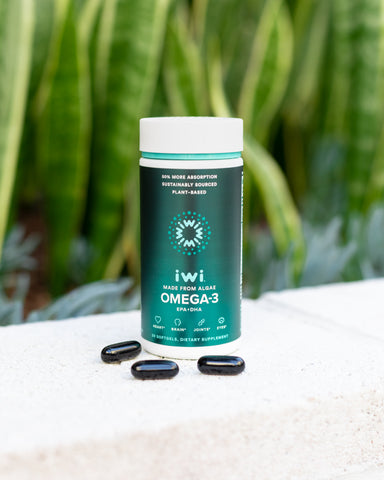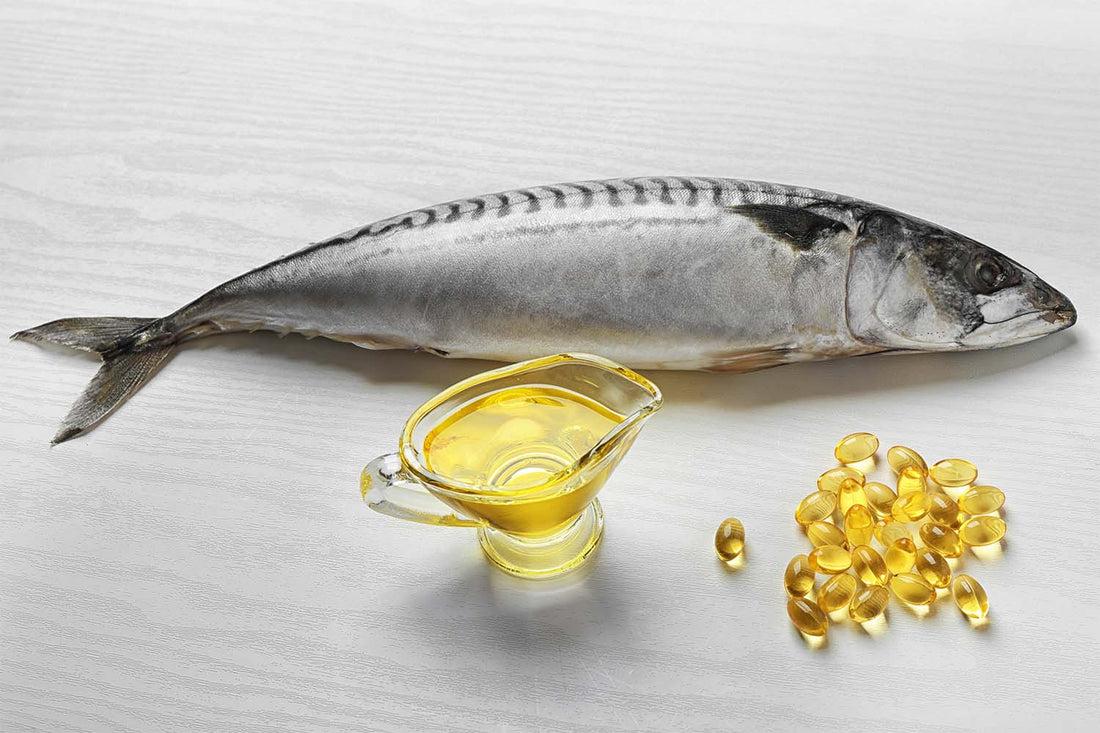One such popular supplement is fish oil.
People have been taking fish oil for decades. It’s a source of omega-3s, which are healthy unsaturated fats, and sometimes vitamin A and vitamin D3. But is there a better option out there?
One other source of omega-3s that has been rising in popularity in recent years is algae oil. So today, we’re going to compare these two omega-3 sources and see the pros and cons of each one. Let’s get started.
Why Omega-3s?

Omega-3 fatty acids are a very important type of fat in our diet. Fats are a critical part of our diet that give us energy, help our bodies absorb various nutrients, and maintain our cell membrane health. Fats are among the three macronutrients that make up the human diet, alongside carbohydrates and proteins.
But not all fats are created equal. Saturated fats are a passable source of fat, and trans fats can raise your cholesterol level and increase your risk of heart disease. But unsaturated fats are great for your body and can improve your health in many ways.
Omega-3s are long-chain polyunsaturated fats, making them some of the best fats that you can get. There are three main omega-3s: docosahexaenoic acid (DHA), eicosapentaenoic
acid (EPA), and alpha-linolenic acid (ALA). But they can be somewhat tough to find in many people’s diets.
What Foods Contain Omega-3s?
The foods containing the most omega-3s are typically fatty fish like salmon, mackerel, and tuna. The oils from these fish have high amounts of omega-3s, making them a great source of protein and fat.
Plant sources of omega-3 pose a bit of a challenge, since nearly all plants considered high in omega-3 actually contain ALA, which the human body uses as a precursor to the more sought-after DHA and EPA. Even when we eat plenty of flax seeds, chia seeds, and walnuts, we still may come up short on our body's requirement for DHA and EPA.
But again, these foods don’t always find their way into our diet. These food sources just aren’t that common in the average American’s diet, so many people just don’t get enough omega-3s.
What Are the Benefits of Omega-3s?
Omega-3s do a lot for the body. For starters, they support a healthy heart. Omega-3 fats, especially EPA, may help support healthy triglyceride levels, which can benefit your heart.
Omega-3s can also help support the nervous system cell membranes, working to keep healthy nerve cells functioning. EPA and DHA may even help maintain the healthy structure and function of the brain.
Omega-3s can even have benefits for joint, bone, and muscle health. Omega-3s help your body retain healthy calcium levels, which in turn supports the health of your musculoskeletal system.
All of these benefits have a trickle-down effect on the rest of your body. Healthy core systems make for a healthier life all around.
What Is Fish Oil?

Fish oil is derived from the flesh of various fish like mackerel, salmon, and tuna. The fatty flesh of these fish contains high amounts of EPA and DHA, making them a desirable source of omega-3s.
How Is it Harvested?
To process and create fish oil, you first need fish — and a lot of them. The fish that are caught for their oil are typically caught by small- to medium-sized boats dragging large nets, which create the problem known in the fishing industry as "bycatch"--the accidental killing of other sea creatures. According to a report by Oceana, as many as 63 billion pounds of bycatch are caught each year, including sea turtles, whales, sharks, and other fish.
Even setting aside the problem of bycatch, the amount of fish needed to fulfill consumer demand for omega-3 supplements creates a problem for the oceans. As many as 1 in every 8 fish caught in the world goes to make supplements instead of food, putting a strain on the ocean's ecosystem
To break it down to a personal level, to produce enough omega-3 oil for just one customer for a year would require 110 fish.
What Is Krill Oil?
You may have spotted krill oil supplements in the omega-3 section. What is krill? If you're thinking about what whales eat, you're exactly right. Krill are very small animals in the same family as shrimp and lobsters. They're found in all of the world's oceans and are considered a keystone species in the ocean food chain: without them, the whole structure of the food chain would collapse. Krill are eaten by not only whales, but seals, penguins, and other fish.
Krill oil became popular as a supplement within the last 20 years because the omega-3 in krill's bodies is bonded to a phospholipid, making it easier for the human body to absorb and use than fish oil.
Some major natural food stores refuse to sell krill oil, though, because of the disruption to the ocean's ecosystem. To get enough krill oil to provide a year's worth of supplements for just one person, 13,600 krill would have to be taken from the ocean. If you multiply that by the number of customers buying omega-3 supplements each year, 18 million, you can see that taking that many krill (or fish) from the sea leaves a gaping hole in the food chain.
What Is Algae Oil?
In recent years scientists have discovered the benefits that algae oil has for omega-3 supplements.
This simple plant is changing the omega-3 industry.
For starters, algae provides a plant-based option for omega-3 supplements. Most plant-based sources of omega-3s only contain ALA, but algae contains ALA alongside levels of DHA and EPA that are equivalent to fish oil sources. This provides a plant-based source of omega-3s for vegans, vegetarians, and others who prefer plant-based diets.
Not only that, but the body may absorb certain forms of omega-3 from algae oil more efficiently than either krill or fish! The form of the fat makes all the difference.
As we discussed earlier, krill oil became popular because its phospholipid form was easier for the body to absorb and use than fish oil, which contains fat in the form of triglycerides.
Algae oil from nannochloropsis is unique: it produces omega-3 fat in a polar lipid form. You can think of this as making the fat both fat- and water-soluble, optimizing digestion and absorption.
How Do We Obtain Algae Oil?
Farming algae and algae oil is fairly straightforward.
When it comes to algae-based supplements, the algae can be grown in a farm outside of the ocean. To grow algae, all you need is salt water and sunlight, both of which are abundant in nature.
Many of these farms exist in arid areas, and the processing, purifying, and encapsulating happen at our locations across the U.S. and Mexico. The algae is refined and fortified with additional valuable nutrients and then packaged into a nutritional supplement. Our algae farms are set in the desert of West Texas and southern New Mexico.
Don’t get us wrong — the cultivation and ultimate encapsulation of our algae still requires multiple steps. However, the environmental benefits of algae oil as compared to fish oil still outweight the cons.
Is Algae Oil Sustainable?
One of the biggest benefits of algae oil, as opposed to fish oil, is its environmental sustainability as an industry.
Fishing is expensive and difficult, and it requires many purification steps. Not to mention, it has a direct effect on the ocean’s ecosystems by taking out so many fish.
Even more, krill are a vital contributor to our fight against climate change. There are microalgae throughout the ocean that absorb atmospheric carbon. The krill then eat these algae and excrete them at the bottom of the ocean, where they are safely deposited as sediment — a highly effective form of carbon sequestration.
Krill are an important part of a chain reaction that takes carbon out of the atmosphere, so leaving them in the ocean is crucial.
Algae, on the other hand, is incredibly sustainable. It grows relatively quickly and requires little maintenance: just sunlight, moving saltwater, and some nutrient inputs. Growing algae in farms has little ecological impact, so it works to maintain the ocean’s ecosystems by letting them be.
Not only that, but it is a far more efficient source of potent omega-3s than fish or krill — because fish and krill get their omega-3s from algae in the first place.
In addition, algae farms are incredibly efficient at producing nutrients in general. Algae farms produce more essential protein per acre and gallon of water than traditional plant or animal-based farming.
In addition, algae farms are incredibly efficient at producing nutrients in general because algae can be grown and harvested year round as opposed to other protein sources, like peas, that only produce seasonally!
How Well Does the Body Absorb Algae Oil?
Algae oil is also absorbed easier by your body than fish oil or krill oil. One study shows that EPA from algae oil is absorbed by the body almost twice as efficiently as from fish or krill oil.
This means that if you consume an equal amount of omega-3s from each source, your body would get more out of the algae oil than it would from the fish or krill oil.
That means more valuable omega-3s to support the health of your body.
Final Takeaway

If you’re looking to boost your intake of omega-3s, you have an important decision to make.
If you care about sustainable products, the environment, and getting the most efficient source of omega-3s, then algae oil seems to be a clear choice.
Here at iwi life, our high-quality omega-3 supplements are algae-based and contain both EPA and DHA omega-3s alongside omega-6s, omega-7s, and omega-9s for complete support for your joints, eyes, brain, and overall health.
Sources
Importance of EPA and DHA Blood Levels in Brain Structure and Function | PubMed Central (PMC)
Omega-3 Fatty Acids Fact Sheet for Consumers | National Institutes of Health
WASTED CATCH: UNSOLVED PROBLEMS IN U.S. FISHERIES | Oceana
The Science — And Environmental Hazards — Behind Fish Oil Supplements | NPR



















